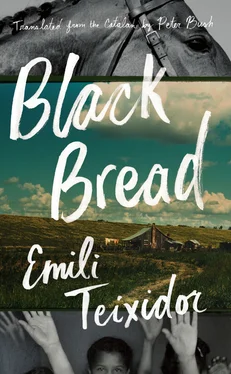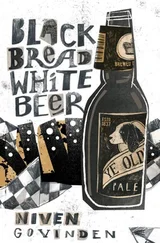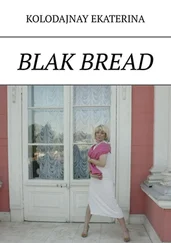“Of course, we went through all that with Mariona and it is a pain. And you haven’t had the gossip yet, we even had a belling of the husband.”
“I never expected all this, I really didn’t. After all we had to go through over Fonso’s plight, it’s not fair we’ve got another disaster to face now.”
Aunt Ció left the kitchen as if she and Mother had planned they would leave us alone, saying: “When the time comes, we shall return to all this.”
“Poor Ció, so many headaches!” Mother exclaimed, squeezing my waist even more tightly, as if I understood everything they’d talked about.
I said nothing. It was the first time Mother and I had met at the farmhouse since Father had died. She removed her arm and I sat at the table, opposite her.
“What do you think about all this carry-on?” she asked, looking into my eyes.
I felt she was thinner, with sunken cheeks, a pointier nose and the bags under her eyes seemed more puffed up. Her hair was combed back, with small curls on her neck like remnants of an old perm, and she was wearing a dress dyed black that left smudges on her nape and wrists. I found the look in her eyes and her attitude in general much less vigorous, as if she was suffering from days of exhaustion.
“I don’t know…” I replied, simply to say something. I couldn’t think what she expected me to say.
“Grandmother still doesn’t know the whole story,” she suddenly added. It was one of those changes I wasn’t sure how to interpret, when I went from being an ignoramus to a confidant, which made me reflect that the grownups, my mother, weren’t sure how to treat us littl’uns, “be careful not to say a word to her, we don’t want her having a stroke.”
I nodded, with little conviction. I found those changes disconcerting.
“They’ve told her Enriqueta had to go to Barcelona for a while for work reasons. However, she knows nothing about the novice from Saint Camillus. She’d not cope with the idea of those two scarpering off in an underhand way. We’ll see what kind of a go they make of it.”
I didn’t react on the outside, in front of my mother. Inside, I felt I was collapsing, as if that would-be monk had gutted me or my heart had switched sides. Xavier, the little friar from Navarra, so silent and unassuming, so well-mannered, with his fragile white face, long pianist’s fingers and green eyes like a couple of olives? Did this mean they could leave the closed order, if they wanted, that anything was allowed, if they dared try it on? In a flash I saw the naked youth with TB lying on the sheet under the elm tree in the heartsease garden. I didn’t know why I was connecting those two right then, what the sick boy was doing next to the Navarrese novice, or what link existed between the two of them apart from the fact they lodged in the monastery, one within the community and the other in the infirmary. There must be a secret connection I couldn’t identify, like the hatred unleashed within me by the teacher in the Alsace-Lorraine school’s last lesson and Mr. Madern, the teacher in the Novíssima, who seemingly weren’t linked, but were like distant twin brothers embroiled in a peculiar mix of politics and education, of war and schooling, and, as I was beginning to grasp ever more clearly, in the kind of seduction they practised over their pupils, sexual in the case of the man in the Novíssima, and political and patriotic in the Frenchman’s. Two forms of violence I found repugnant. That’s why I was at a loss, and didn’t know what to think about the new secret link I was now discovering, but there must have been a reason why the unassuming and seductive novice and the sick adolescent whose fragile nakedness now came into my mind together.
Mother must have noticed something was going on inside me, because she asked: “Hadn’t anybody told you?”
“They told Quirze to run to the Saint Camillus monastery in the pitch-black to fetch Father Tafalla and another friar,” I let slip, following the thread of my own thoughts.
Mother opened her eyes wide and leaned towards me.
“Now let’s talk about you,” she said, in a voice that showed she wanted to move the conversation on. “Let’s talk about what directly concerns us. Mr. and Mrs. Manubens came to see you, didn’t they?”
I nodded, avoiding her gaze.
“And…?” her voice sounded less of sure of itself now.
I looked at her, willing her to help me guess what she was thinking, but I didn’t say a word.
“What did you think? What did they say? Did you come to an agreement?”
“You knew them already, didn’t you? Hadn’t you spoken to them? How did you leave it?”
Mother must have imagined the opposed emotions that were paralyzing me. She explained: “I went to see them in Vic with Aunt Ció. They’d sent me a note to go and see them as soon as I could. They were very nice. Didn’t Aunt Ció tell you?”
“She never tells us anything,” I couldn’t soften the touch of rancour in my voice.
“She must have left it for me come and tell you. Aunt Ció has also had days with lots of work and lots of upsets, like us, so don’t blame her for anything. I expect she intended telling you about it but with all her ups-and-downs she couldn’t find the right moment.”
She paused. In the meanwhile she changed her stance, as if trying to get more comfortable; she folded her arms and rested her elbows on the edge of the table, in a stiff, authoritarian pose, then unfolded them, lay her palms upwards on the table, looked at the ceiling, and said: “I won’t do anything you don’t want. If you want to go with them, I’ll let you, but if you’d rather stay at home, you can. It’s your home. Grandmother, your uncle and aunt, have done enough, far too much for us over these last few years. You can’t stay here any longer. Núria will be off too, as soon as your Uncle Fonso has settled into his new life in France, I think he’s already found work in a vineyard near Perpignan. You must tell me. As I am now, by myself, I can’t do any more for you, in terms of your schooling, I mean. I’ve also spoken to the priest in the parish school and he thinks that if you have an opportunity to study, you should. When he told me what the books cost, and only the books, I took fright: almost two weeks’ wages from the factory. What would we live on if I had to pay for all that?”
Mother’s face was a blur, a fog of anxiety erased her from my field of vision. It was that same voice, that same spiel, the leprosy of poverty one couldn’t jettison, that neither of us could jettison because her voice, her anguish and laments passed the infection to me. Her voice brought me back yet again to the streets in our town showing off my First Communion outfit, strutting my stuff before friends and acquaintances, pressuring them into giving me a small present, a memento, charity. Or the visits, by her side, to the local toffs, factory owners and powers-that-be, to beg them to do something to get Father out of prison, out of hospital and off the death sentence. When I was with her I was always under the impression that I was witnessing a mammoth struggle, one that was lost before it was started, to cast off the wretchedness, penury and misfortune that had pursued us ever since the pair had foolishly left the grandparents’ farm, had gone far from the silent, tranquil refuge of the forest. I admired that woman who fought tirelessly, fiercely, in her battle against the scourge of poverty, yet rebelled when for convenience’s sake, or clear-sightedly, she floundered in that parasitic swamp of shame, as if the fate we confronted was inescapable.
“It’ll only be for a period and you can come back whenever you want, naturally. It will always be your home, you know. I’ll come to see you. Mr. and Mrs. Manubens have been very generous. They don’t have children and want to help you to get on in life, if you can manage it. Didn’t you say you’d like to be a doctor?”
Читать дальше












